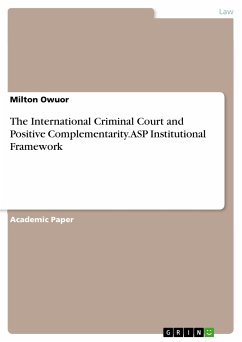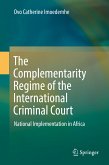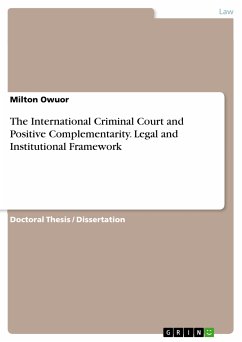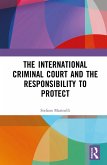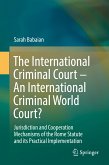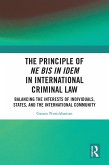Academic Paper from the year 2017 in the subject Law - Comparative Legal Systems, Comparative Law, grade: 1.0, University of Pretoria, language: English, abstract: This study seeks to establish how the legal and institutional framework for positive complementarity may be effectively implemented. It is argued that the existing legal and institutional framework in respect of the effective combatting of impunity is largely unsatisfactory. The evolution of the principle of complementarity, in the context of the Rome Statute, is explored with emphasis on the theoretical constraints on the principle which, in turn, raise practical challenges. The analysis provides a theoretical background to the conceptualisation of positive complementarity. The study traces the evolution and development of the concept of positive complementarity, examining its characteristic features and attributes, and the possibilities and opportunities the concept presents for the effective combatting of impunity. It examines the various scholarly arguments and propositions advanced to explain the concept of positive complementarity, and analyses the attendant challenges and limitations. It is noted that there is no fixed and universally acceptable definition of positive complementarity. It is therefore argued that there is a need for the establishment of a coherent legal and institutional framework for positive complementarity. In this light, appropriate policy alternatives and considerations both domestically and internationally, are considered. On the international level limitations characterising the current institutional framework of the Secretariat of the Assembly of States Parties (ASP Secretariat) are identified. It is argued that a fundamental restructuring of the ASP Secretariat is essential and measures to restructure the ASP Secretariat in order to reinforce its effectiveness in fulfilling its mandate on positive complementarity are identified. At the domestic level, the various aspects of implementing legislation are discussed. In conclusion, the establishment of an independent office to address positive complementarity and revitalise the institutional framework within the legal structures of the ASP Secretariat, is examined. The study envisages that the proposed institutional framework for the ASP Secretariat, if implemented, would effectively support the national jurisdictions of state parties in their implementation of the concept of positive complementarity. This study represents an unequivocally original contribution to knowledge and research.
Dieser Download kann aus rechtlichen Gründen nur mit Rechnungsadresse in A, B, BG, CY, CZ, D, DK, EW, E, FIN, F, GR, HR, H, IRL, I, LT, L, LR, M, NL, PL, P, R, S, SLO, SK ausgeliefert werden.

